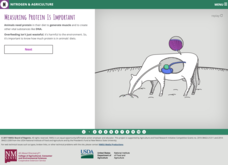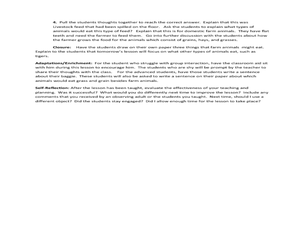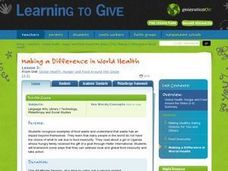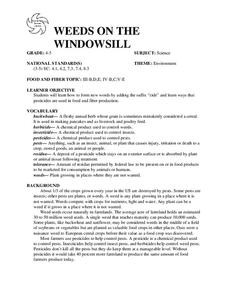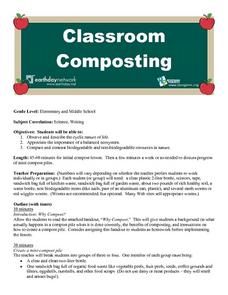Learning Games Lab
Nitrogen in Feed
Knowing what farmers are feeding livestock is just smart business. A WebQuest lesson helps learners build an understanding of the relationship between amino acids, nitrogen, and protein. With interactive instruction, scholars practice...
Curated OER
What's in it and Who Eats it?
First graders explore farming by illustrating images. In this livestock lesson, 1st graders discuss what types of plants are used to feed livestock animals and how pets and humans eat the livestock animals. Students draw images of what...
Curated OER
They Don't Just Eat Grass
Young scholars consider the USDA daily recommendations to create a "feed" product for middle schoolers. In this Health lesson, students learn about the ingredients in feed that is fed to livestock and apply the method to creating feed...
Curated OER
They Don't Just Eat Grass
Pupils explore and examine different types of feed used for livestock. They discuss types of feed, the need for energy and health, and create graphs of food compared to categories. Students organize data and complete worksheets on...
Curated OER
Making a Difference in World Health
Students discover environmental awareness by conducting a collection project in class. In this global food lesson, students identify the importance of feeding all of the humans on Earth and discuss why some aren't properly nourished....
Curated OER
WEEDS ON THE WINDOWSILL
Discuss the suffix "cide." Have students name words having this suffix (homicide, suicide, genocide). Ask students what all these words have in common. Then ask students to define the word "pesticide." (Pesticides control organisms that...
Curated OER
The Bean Book
A well-designed book on beans teaches kids about the anatomy of a bean. They cut out parts of a bean and paste them together. There are a lot of good descriptions of the parts of beans, such as the embryo, stored food, and the seed coat....
Curated OER
Organic Farming / Agriculture
Want an organic farming resource packed with experiments, background information, science fair projects, and topics of interest for further research? Here it is. Young environmental scientists can explore concepts involved in organic...
Curated OER
Tens! Hundreds! Thousands!!! of Tons
Fifth graders take a close look at the types of ships that travel through the Hudson River Valley on the Hudson River. They utilize worksheets embedded in the plan in order to answer questions about exactly what is being shipped, and how...
NOAA
It All Runs Downhill
Examine how pollution makes its way into an ocean with help from a model watershed. Scholars use household items to recreate a mini-watershed, equipped with pollutants, that when mixed with rain drain into a model's body of water. After...
Curated OER
Toward a Sustainable Agriculture
Students examine how to use ecological analysis to animal production systems. In this sustainable agriculture lesson students examine where the nutrients flow in a system and complete several activities.
Curated OER
Step by Step
Students explore agriculture by creating a food production diagram. In this farming lesson, students read assigned text about the entities that assist in food production companies such as farmers, truckers and supermarkets. Students...
Curated OER
Composting
Using 2-liter bottles, junior ecologists create composting tubes in which they place nitrogen-rich and carbon-rich materials. They observe what changes occur over two weeks' time. Provide more specific direction to your class as to what...
Curated OER
Big Boats Up The River
Using boats along in the Port of Albany as the focus, learners practice adding single-digit numbers and interpreting data. This lesson comes with the worksheets, resource links, and other materials to make it a worthwhile experience.
Curated OER
A Field of Beans
Beans, or legumes as they are sometimes called, are the topic for an integrated multi-subject lesson. Youngsters will read, write, observe, and research everything there is to know about beans. They read a bean story, conduct a bean...
Curated OER
A Dog's Life
Students get a look into the life of dogs-from their origins and basic biology, through selective breeding, and into how dogs have become intricate parts of everyday life for many people worldwide.
Curated OER
Ag in My Community; Agriculture
Learners build knowledge about agriculture as it relates to their communities' commodities. In this agriculture instructional activity, students brainstorm about conditions in their community with regards to growing different types of...
Curated OER
Fur, Feathers and Fins
Students examine the stages between growing the animal and buying it at the grocery store. In food system instructional activity students study the role that animal products have on nutrition and study animal agriculture.
Curated OER
Agriculture Cares for the World
Students explore world geography by analyzing agriculture. In this dietary habits lesson, students discuss the role parents play in their children's diet and where the food comes from. Students write agricultural research paragraphs and...
Curated OER
BIOASSESSMENT OF STREAMS
Young scholars work as a team to gather organisms from a stream to evaluate if the water quality is excellent, good, or fair to poor.
Curated OER
Classroom Composting
Learners discover the benefits of composting. They identify the steps of decomposition as well. They are read a book and discuss what items decompose.
Curated OER
Corn in Legend and Myth
Seventh graders compare myths and legends about corn and use creative abilities to act them out. In this corn legends lesson, 7th graders read background information about corn and its importance. Students work in groups to research...
Curated OER
Cows in Crisis
Students study mad cow disease and how it has affected the lifestyles of many Europeans. They examine local cattle industry and look for steer- or cow-related products. They organize information they find and present it to the rest of...


